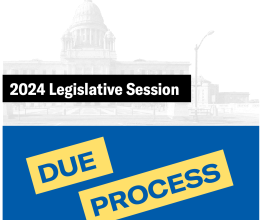The Rhode Island ACLU and the National Center for Law and Economic Justice, a national organization that promotes economic justice for low-income families, today announced that a favorable settlement had been reached in their federal lawsuit filed in July against the state Department of Human Services (DHS), alleging that the state’s failure to timely process food stamp applications was resulting in the denial of “desperately needed assistance to help [applicants] feed their families,” and forcing them to “suffer hunger as a result.” The class-action lawsuit, filed by RI ACLU volunteer attorney Lynette Labinger and attorneys for the National Center for Law and Economic Justice, had sought an injunction requiring the state to process food stamp applications within the time frames established by federal law.
Under the detailed 11-page settlement order entered by agreement of the parties, and awaiting approval from U.S. District Judge William Smith, the state denies any liability but has agreed to a series of steps to ensure its compliance with federal law requirements. The settlement requires the state to comply with all federal timelines for screening and processing food stamp applications, including those eligible for expedited service. The settlement order also establishes a process for the plaintiffs’ attorneys to bring to the attention of DHS for prompt resolution any instances brought to their attention where the timelines appear to have been missed. In order to further ensure compliance, the settlement requires DHS to provide to ACLU and NCLEJ attorneys through the end of next year a monthly report containing detailed statistics on the food stamp applications received by DHS and the time it took the agency to process them. Finally, the settlement permits the ACLU to seek attorneys’ fees for its work on the case.
Under federal law, states participating in the food stamp program are required to process food stamp applications within thirty days of the date of application, and to provide expedited food stamps to eligible households within seven days. In June 2009, more than 107,000 Rhode Islanders participated in the program, and in May of this year alone, more than 5,000 applications were submitted for food stamps. Yet recent statistics from the federal government’s Food and Nutrition Service indicated that almost one-fifth of Rhode Island’s food stamp applications were not processed in a timely manner.
The lawsuit was filed as a class action on behalf of all food stamp applicants affected by DHS’ failure to process the applications in a timely manner. Referring to the many families affected by DHS’ failure to abide by the federal timelines, the brief filed in the case noted that “food stamps are an essential source of support that permits them to survive at the barest edge of poverty. Without food stamps, a meager subsistence benefit, they will be unable to purchase food for themselves and their families. None of them can suffer the loss of food stamps without experiencing serious harm.”
In response to the filed settlement agreement, RI ACLU volunteer attorney Labinger said today: “I am very pleased that we were able to work out a settlement with the state on this important issue. We believe that the order entered today will protect Rhode Island’s most vulnerable families from the delays and inaction that literally left some children going to bed hungry at night.”
“We are glad that the state has agreed to comply with its legal obligation to provide food stamps within the time frames required by law. Food stamps are a critical benefit for low income families,” added Cary LaCheen, Senior Staff Attorney at the National Center for Law and Economic Justice.





